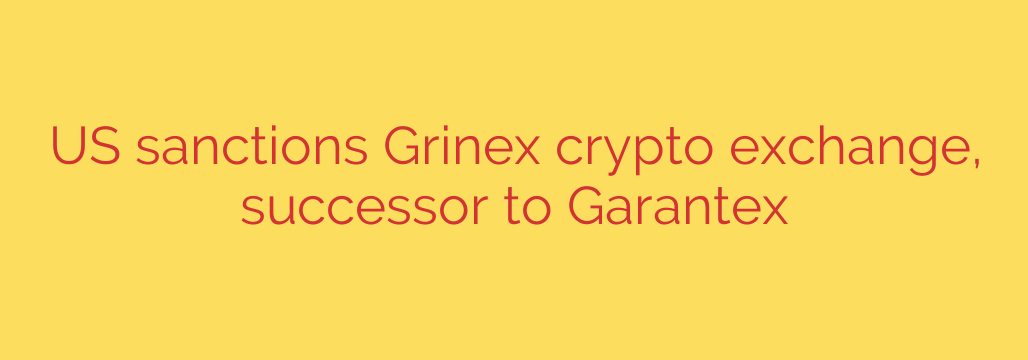
Grinex Crypto Exchange Sanctioned by US Treasury for Illicit Activities
The United States Department of the Treasury has taken decisive action against another cryptocurrency exchange, adding the Russia-based Grinex to its list of sanctioned entities. This move highlights the growing commitment of global regulators to crack down on virtual asset service providers (VASPs) that facilitate illicit financial activities and undermine international sanctions.
The designation, enforced by the Treasury’s Office of Foreign Assets Control (OFAC), effectively cuts Grinex off from the U.S. financial system and prohibits American citizens and entities from transacting with it. This action serves as a stark warning to the broader cryptocurrency industry about the serious consequences of non-compliance and enabling criminal enterprises.
Why Grinex Was Targeted: A Direct Link to Garantex
The sanctions against Grinex are not an isolated event. According to investigators, Grinex was identified as a direct successor to the notorious Garantex exchange, a platform that was itself sanctioned in April 2022 for its extensive involvement in illicit finance.
Garantex was known for processing hundreds of millions of dollars in transactions linked to ransomware attacks, darknet markets, and other criminal operations. After the initial sanctions were imposed, it appears that the operators of Garantex sought to continue their activities under a new name to evade regulatory scrutiny. Grinex allegedly operated using much of the same infrastructure and personnel as its predecessor, representing a clear attempt to bypass international financial restrictions.
By sanctioning Grinex, the Treasury Department is sending a clear message: simply rebranding or using shell companies to continue illicit operations will not be tolerated. Regulators are becoming increasingly sophisticated at tracing digital footprints and uncovering complex corporate structures designed for sanctions evasion.
The Broader Implications for the Crypto Ecosystem
This enforcement action underscores a critical trend in the digital asset space: the era of unchecked, anonymous transactions is rapidly coming to an end. Governments worldwide are intensifying their focus on ensuring that cryptocurrency exchanges adhere to the same rigorous standards as traditional financial institutions.
Key takeaways from this development include:
- Increased Scrutiny on Compliance: Exchanges that fail to implement robust Know Your Customer (KYC) and Anti-Money Laundering (AML) protocols are at high risk of regulatory action. These measures are essential for preventing illicit funds from entering the financial system.
- The End of Anonymity as a Business Model: Platforms that actively market themselves as havens for anonymous transactions are increasingly viewed as high-risk by regulators. Their operations are often intertwined with criminal networks seeking to launder money or finance illegal activities.
- Chain Analysis and Tracking are Powerful Tools: Law enforcement and regulatory agencies have demonstrated a powerful ability to analyze blockchain data. They can connect seemingly disparate entities and expose networks designed to circumvent sanctions, as seen in the case of Grinex and Garantex.
How to Protect Yourself and Your Crypto Assets
For legitimate cryptocurrency users and investors, this news serves as a critical reminder to exercise extreme caution and due diligence when choosing a trading platform. Interacting with a sanctioned entity, even unknowingly, can lead to frozen funds and potential legal complications.
Here are actionable steps to ensure you are using a safe and compliant cryptocurrency exchange:
- Verify Regulatory Status: Only use exchanges that are registered and compliant with financial authorities in reputable jurisdictions. Look for clear statements on their website about their legal status and the regulations they follow.
- Scrutinize KYC/AML Policies: A legitimate exchange will require you to verify your identity. While it may seem inconvenient, strong KYC and AML procedures are a sign of a compliant and secure platform. Be wary of any exchange that promises “no questions asked” or fully anonymous trading.
- Research the Exchange’s History: Perform a thorough search for the exchange’s name, its founders, and its corporate history. Look for any links to sanctioned individuals, previous security breaches, or regulatory warnings.
- Avoid Platforms with Obscure Ownership: If you cannot easily determine who owns or operates an exchange or where it is physically based, consider it a major red flag. Transparency is a key indicator of trustworthiness.
Ultimately, the sanctioning of Grinex is another step toward maturing the cryptocurrency market. By weeding out bad actors, regulators are helping to create a safer and more stable environment for innovation and legitimate investment to flourish. For users, the lesson is clear: prioritize security and compliance over the promise of complete anonymity.
Source: https://www.bleepingcomputer.com/news/security/us-sanctions-grinex-crypto-exchange-garantexs-successor/








